Remember the first time you saw a Smart parked at 90 degrees to the kerb? It’s easy to forget just how radical this tiny two-seater looked back in 1998. While BMW turned to the past with its retro-remake Mini, arch-rival Mercedes-Benz was forging into the future. The City Coupe broke the mould, both in how it was engineered and marketed. Sometimes even in how it was parked.
Our Retro Road Test car is an immaculate 2001 Smart Pulse with just 7,400 miles on the clock. It’s a relatively new addition to Mercedes-Benz UK’s heritage fleet: a mark of the original Smart’s emerging cult status.
What are its rivals?
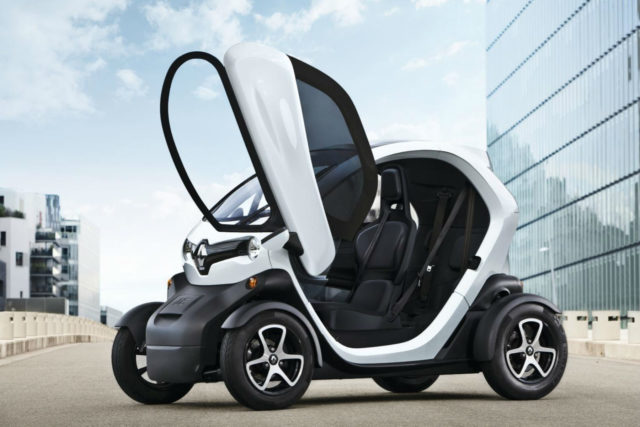
Unless you count horrific quadricycles like the G-Wiz and French Aixam models, the Smart had no direct rivals. The Toyota iQ later tried and failed, while the electric Renault Twizy (pictured above) is a far less practical proposition. More recently, the Citroen Ami treads a similar path of back-to-basics minimalism.
If you’re in the market for a chic city car, more conventional alternatives include the Fiat 500, Renault Twingo and Volkswagen Up. All are fully-fledged superminis that accommodate four people and more luggage than the Smart. None, however, can park perpendicularly.
Which engines does it use?
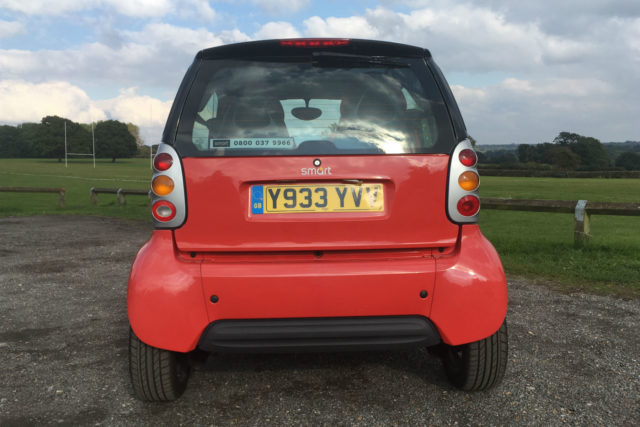
The City Coupe was offered in three specifications: Pure, Pulse and Passion. Our mid-range Pulse has a 55hp 599cc petrol engine that gets it to 62mph… eventually (OK, 17.2 seconds). Top speed is 84mph. Smart also sold 45hp and 62hp versions of this engine, along with a 41hp 0.8-litre CDi diesel.
All models use a six-speed semi-automatic gearbox, which allows sequential manual shifts by simply pushing the lever back or forth. A bit like a racing car then? Er, not exactly.
What’s it like to drive?
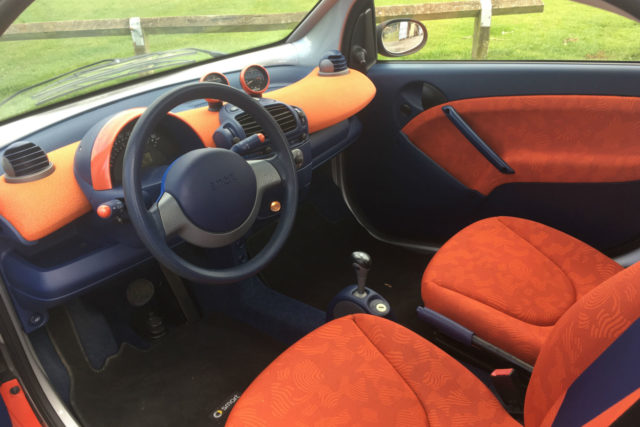
Mention the City Coupe in conversation and talk of that gearbox is never far away. Slow, jerky and unintuitive, it’s the car’s Achilles’ heel.
For an impression of how if feels to drive, let’s imagine you are pulling away briskly from the traffic lights. The process goes something like this: accelerate – lurch forwards – pause – pause a bit longer – lurch backwards – accelerate – repeat until nauseous. Making smooth progress is nigh-on impossible, even if you swap cogs yourself. And while the Smart is far more civilised at slow speeds around town, it’s difficult to believe Mercedes-Benz signed-off such a flawed drivetrain.
Despite this rather large caveat, all of the team at Motoring Research enjoyed driving the City Coupe. Its unassisted steering provides more feedback than a modern Smart ForTwo and the buzzy three-cylinder engine is eager to rev. And driving such a small car simply makes sense in traffic-choked south-east England. The joy of nipping into motorcycle-sized gaps, U-turning in a narrow road or parking in places others can’t should not be underestimated.
Reliability and running costs

The City Coupe is economical (57.6mpg) and cheap to tax (118g/km CO2). However, awkward engine access means maintenance costs aren’t as low as you might hope, particularly if you visit a Mercedes-Benz dealer.
We suggest using the network of Smart specialists, who offer much lower labour rates – and joining the very active owners’ club for discounted parts and insurance. Search for ‘The Smart Club’ online.
Could I drive it every day?
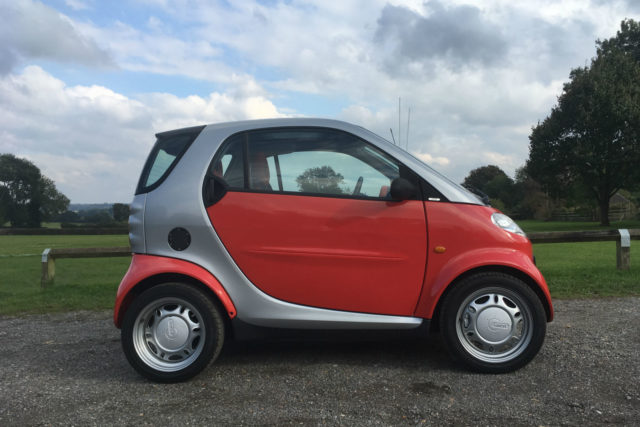
The City Coupe is more practical than it looks. Granted, the boot is barely big enough for a weekly shop, but drivers under 5ft 10in will find additional stowage behind the seats. There’s also a usefully large shelf atop the dashboard.
The high-set seat and fixed steering wheel make for a very upright driving position – you’re sitting on top of the engine, remember? – which gets wearing on longer journeys. However, all-round visibility is good and there’s no shortage of space for the driver and passenger.
You might want to upgrade the cassette player fitted here, though – our crackly copy of Rave ’92 also got wearing on those longer journeys.
How much should I pay?
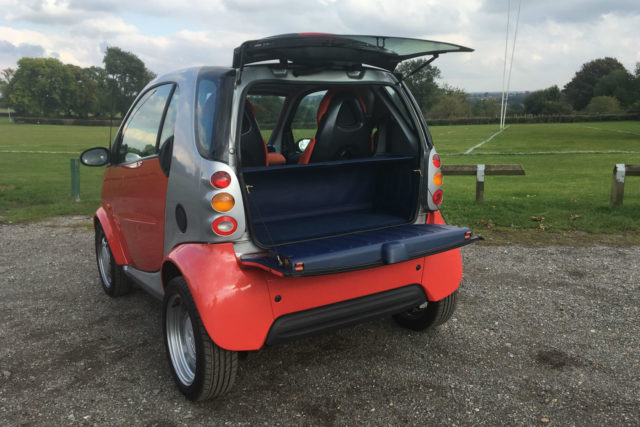
There are plenty of first-generation Smarts (initially named City Coupe, later ForTwo) in the classifieds. Prices start from around £1,500, but we’d spend a bit more for something that isn’t on the verge of an engine rebuild.
Early, left-hand-drive cars like this one are the most collectable (RHD didn’t arrive until autumn 2001), while quicker Brabus models – and the related 2003-2006 Smart Roadster – also command a premium. Expect to pay around £4,000 for a tidy, low-mileage City Coupe that could appreciate in value if used sparingly.
What should I look out for?
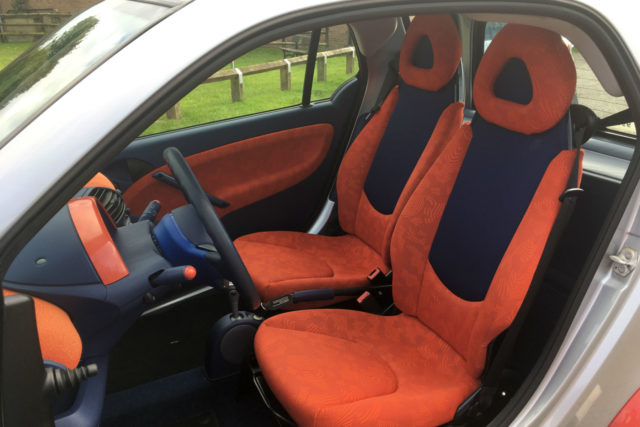
Smarts tend to cover relatively small mileages, but reports of replacement engines aren’t uncommon. The culprit is gunged-up piston rings allowing oil into the engine, causing misfires and a lack of compression. Over time, the problem can destroy the valves, necessitating a complete rebuild or new engine.
Check the oil level and condition, and look for blue smoke from the exhaust tailpipe. Also, as with all used cars, don’t buy without a comprehensive service history.
Should I buy one?
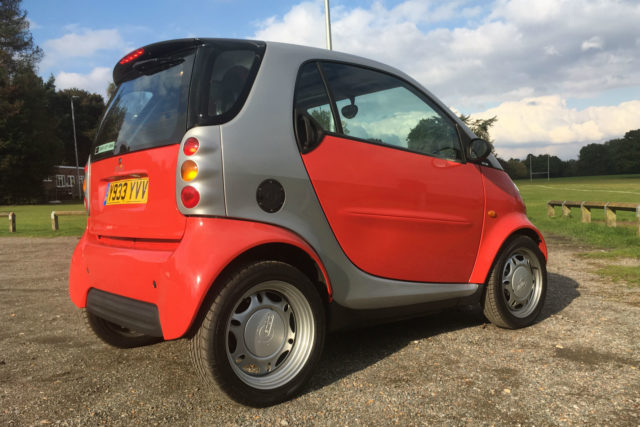
Hot-blooded car enthusiasts will scoff, but an early Smart isn’t without appeal. Its funky, Swatch-inspired design still looks fresh, and its city-centric character is more relevant than ever. There’s no excuse for that gearbox, but think of the City Coupe as a quirky and innovative transport solution, rather than a driving machine per se, and suddenly it makes sense. Particularly if you live in a built-up area.
The original Smart’s place in automotive history is assured. It wasn’t a runaway success like the BMW Mini, but it marked the reinvention of the microcar for the modern age. And in a world where cars grow bigger and more bloated with every successive generation, that’s an achievement worth recognising.
Pub fact
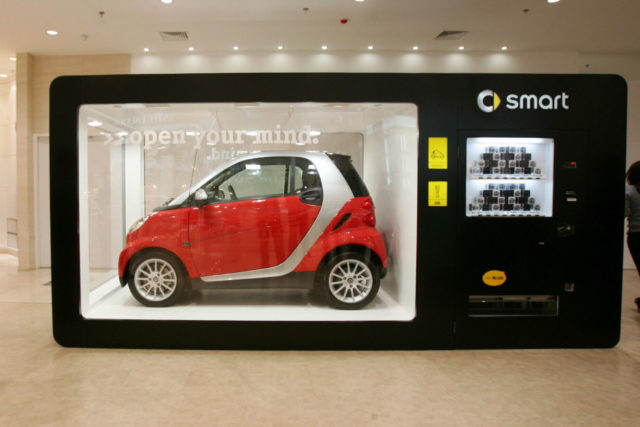
We’d love to tell you this Japanese vending machine dispenses Smart cars. In fact, it was a neat marketing ploy – offering free brochures for the car rolled up in tubes. Still, let’s face it, you’d need an awful lot of loose change for the real thing.
ALSO READ:


